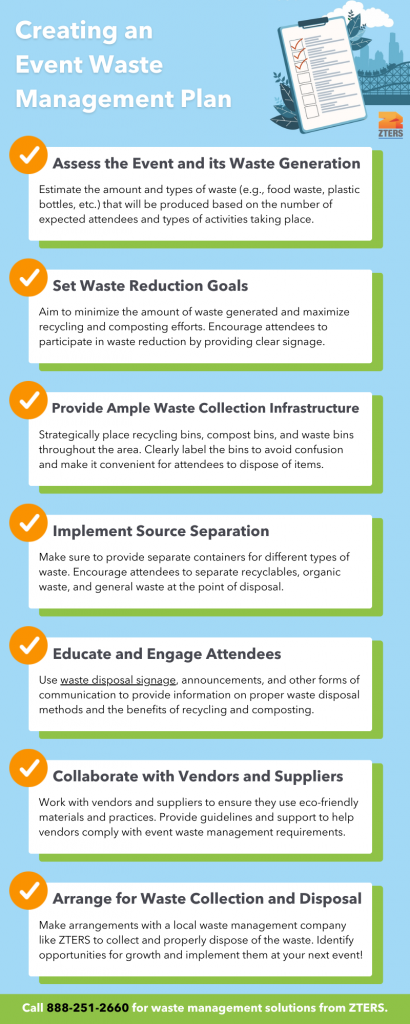There’s no better way to celebrate a special occasion than with a well-planned outdoor event. However, these events often generate a significant amount of waste. If not managed properly, it can have a pretty negative impact on the environment.
To ensure that your outdoor event is environmentally friendly and sustainable, it’s crucial to have a well-thought-out waste management plan in place. For decades, we’ve provided site services for events nationwide. From helping event planners calculate how many porta potties they need to delivering roll-off dumpsters for events, ZTERS is your outdoor event sidekick.
Read on and we’ll guide you through the steps of creating an effective waste management plan for outdoor events. For more on smart event planning, check out our post on hosting an environmentally friendly event.
What is Event Waste Management?
Event waste management refers to the process of effectively and responsibly managing the waste generated at an event. It involves strategies and practices to reduce, recycle, and properly dispose of waste, aiming to minimize environmental impact and promote sustainability.
Step 1: Assess the Event and its Waste Generation
The first step in creating a waste management plan is to assess the event and understand the waste it’s likely to generate. Consider the type of event, the expected number of attendees, and the activities that will take place. This assessment will help you estimate the amount and types of waste that will be produced, such as food waste, packaging materials, plastic bottles, and other disposable items.
Step 2: Set Waste Reduction Goals
Once you have assessed the waste generation, set clear waste reduction goals for your event. Aim to minimize the amount of waste generated and maximize recycling and composting efforts. Encourage attendees to participate in waste reduction by providing education and incentives.
Step 3: Provide Ample Waste Collection Infrastructure
To effectively manage waste at an outdoor event, it is essential to provide easily accessible waste collection infrastructure. This includes strategically placing recycling bins, compost bins, and general waste bins throughout the event area. Clearly label the bins to avoid confusion and make it convenient for attendees to dispose of their waste properly.
Throughout the event, it can be helpful to empty waste bins into one centralized location to help avoid overflow. Our 20-yard roll-off dumpsters are one of our most common rentals for events.
Step 4: Implement Source Separation
Promote source separation by providing separate containers for different types of waste. Encourage attendees to separate recyclables, organic waste, and general waste at the point of disposal. This practice makes it easier to recycle and compost the waste generated at the event.
Step 5: Educate and Engage Attendees
Raise awareness among event attendees about the importance of waste management and their role in reducing waste. Use waste disposal signage, announcements, and digital screens to provide information on proper waste disposal methods and the benefits of recycling and composting.
Need Commercial Waste Service?
Speak with an account manager for a free quote.
Step 6: Collaborate with Vendors and Suppliers
Work closely with vendors and suppliers to ensure they use environmentally friendly materials and practices. Encourage them to use biodegradable or compostable packaging and utensils, as well as refillable water stations instead of single-use plastic bottles. Provide guidelines and support to help vendors comply with event waste management requirements.
Step 7: Arrange for Waste Collection and Disposal
Make arrangements with local waste management companies to collect and properly dispose of the waste generated at the event. (Psst, that’s us!) Ensure that the waste is handled in an environmentally responsible manner, with recyclables and organic waste diverted from landfill.
Step 8: Evaluate and Improve
After the event, evaluate the success of your event waste management plan. Assess the amount of waste generated, the recycling and composting rates, and attendee participation. Identify areas for improvement and make necessary adjustments for future events. Consider feedback from attendees and vendors to refine your waste management strategies.
Creating a waste management plan for outdoor events is essential for promoting environmental sustainability and minimizing the impact on the surrounding ecosystem. Remember, small changes in event waste management practices can make a big difference in reducing our carbon footprint.
Infographic: Event Waste Management Planning

